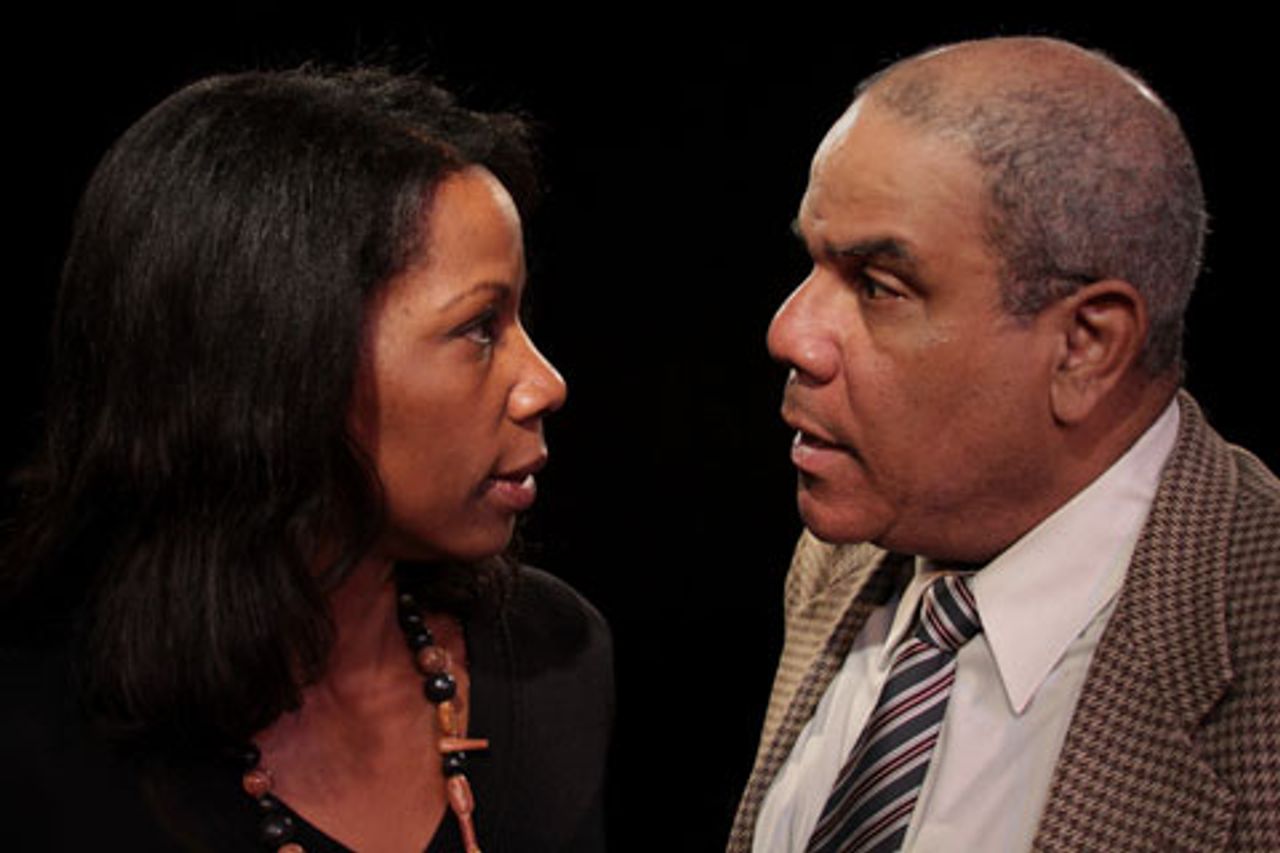Written by Andrew Dolan, directed by Rod Menzies. World premiere, presented by Ensemble Studio Theatre, Los Angeles. Through April 29, 2012 at the Atwater Village Theatre.
The Many Mistresses of Martin Luther King, now receiving its premiere production at Ensemble Studio Theatre in Los Angeles, dives into the turbulent waters of racial stereotyping and identity politics with uncensored abandon. Andrew Dolan’s script is smart, tart, and rich with discomfiting insight. Under the deft direction of Rod Menzies, the ensemble of five attains a depth of social and emotional reality that is palpable and moving without sacrificing the power of ideas to clarify, provoke, challenge, or hurt.
 The Many Mistresses of Martin Luther King [Photo: Tom Burruss]
The Many Mistresses of Martin Luther King [Photo: Tom Burruss]The play revolves around the character of Simon (in a stellar performance by Philip Casnoff), a gadfly sociologist and former social worker whose years in the trenches of Chicago’s notorious public housing project, Cabrini Green, have left him cynical and combative. His tragedy, if it can be considered as such, is that he often mistakes cynicism for realism and mere provocation as speaking truth to power and ignorance. His deeper, and unacknowledged, flaw is that he seems trapped within the very perspectives he critiques, unable or unwilling to confront the class divisions and oppressions that underlie racism in capitalist America.
When we meet Simon, he’s married to a former student, Lashawna (a captivating Tracey A. Leigh); the bitter divorce from his ex-wife has left a nasty residue, and his failure to gain tenure still stings. His new book, “The Many Mistresses of Martin Luther King,” is about to be published. The book is historical fiction, the story of Martin Luther King told through the voices of women with whom King had affairs. The fact that Simon is a white man married to a young black woman writing about a revered American icon from the point of view of black women trips so many landmines of pious hypocrisy that the expected explosions feel all the more potent for their being so thoroughly repressed in heated yet civil academic sparring—until they aren’t.
To complicate matters, Simon’s daughter is about to marry the son of Augustus (Carlos Carrasco) and Janine (Judith Moreland), a black academic couple; he’s the head of the Sociology Department that recently denied Simon’s tenure and in which Lashawna is now an adjunct professor. Janine, a once prominent playwright, is now teaching in the Drama Department. Lashawna’s brother, Anquan (Theo Perkins), is living with Simon and Lashawna after being expelled from the university for stealing an iPod; he’d been enrolled on a basketball scholarship.
Simon’s interactions with Augustus, Janine, and even Lashawna are further complicated by his contempt for his former colleagues—and the entire academic establishment, which he describes as a bunch of intellectual dilettantes on a cruise ship who no longer even want to come ashore to experience the world about which they so fatuously pontificate.
 The Many Mistresses of Martin Luther King [Photo: Tom Burruss]
The Many Mistresses of Martin Luther King [Photo: Tom Burruss]In this play, the labels we use to designate race are sometimes used to disparage, then, a moment later, invoked with pride. Echoing Marshall McLuhan’s classic distinction between archetype and stereotype, Simon forces anyone within hearing (including the audience) to confront the power of stereotype to affirm or disparage. His often scattershot critique of identity politics is bracing, landing welterweight punches with regularity. But what makes this captivating on stage is Simon’s impish delight in his taunts and the relish with which he causes others (including the audience) acute social discomfort. Constitutionally incapable of playing nice, he enjoys playing the maverick bad-boy, a role he nurtures and defends against all comers.
The intriguing dynamic of this play is the way in which the audience is forced to keep trying to label Simon and the others, only to have those labels sabotaged. Is Simon a truth-teller whose glib manner hides a racist heart? Is he merely a middle-aged curmudgeon? Or someone so deeply offended by suffocating political correctness that he refuses to tolerate the polite hypocrisies that make social interaction comfortable? This is a man who passionately believes that the Rev. Martin Luther King is “Rushmore material,” the equal of Washington, Jefferson, and Lincoln. Yet his book, whose actual contents we can only surmise, revels in King’s all too human weaknesses. Simon cites Ralph Abernathy as a reliable authority for shaping his novel around the fact that King was a serial womanizer on the level of John Kennedy.
A constant theme of this play is the question of personal responsibility versus material conditions. It asks, who is to blame for poverty and ignorance and how should that blame be allocated between the social pathologies fostered by structural class oppression (further complicated by racism), on the one hand, and a given individual, on the other? Simon comes down so hard on the side of personal responsibility, he often sounds like an empathy-impaired libertarian. His Jesuitical arguments for blaming the victim are so sharply stated they shock.
There is something repellent about those (à la Bill Cosby and others) who preach morality and “personal responsibility” to people living in the abyss, which spotlights them as well-heeled hypocrites and frauds. From their lofty positions—as parasitical beneficiaries of the exploitation and misery of the mass of the people—they are merely seeking to defend their wealth and privileges against the great unwashed. There is nothing new about this sort of defense of class privilege. What is new is that such rotten ideas find a hearing in the erstwhile liberal middle class, which has given up on its youthful radicalism and now dreams of Apple dividends, security gates, and well-armed policemen.
In a recent interview, playwright Dolan remarked that “I’ve always been fascinated by how people discuss race in America. It’s the defining social issue in our history. I’ve seen many plays that address it, but I’ve always left profoundly dissatisfied because they almost universally pander to the expectations of liberal theatergoing audiences. I wanted to write a play that is not necessarily a reflection of the liberal perspective, and I wanted to write it without apology.” While Dolan’s play definitely does not pander to liberal expectations, it somewhat begs the question of what constitutes his alternative perspective.
Nor is it true, in the first place, that race is the “defining social issue in our history.” The division of society into conflicting social classes is the defining issue, indeed, it is what constitutes the society.
Dolan apparently fails to see that there is a left-wing and a right-wing critique of “identity politics.” Although right-wing critics of feminism, the gay rights movement, and other ethnic identity movements occasionally make a correct point (like the stopped clock that’s accurate twice a day), socialist critics of identity politics are not about to ally themselves with repugnant blowhards like Rush Limbaugh and his ilk. Such figures seek to identify the “left” in the public mind with the identity politics crowd in order to smear and forestall the popularization of genuinely left-wing ideas. Where does Dolan stand? It remains unclear.
The play is effective in the many ways in which it dissects the fault-lines and fatuousness of academia’s disconnect from the real world. Bloodless theory and group-think, stringent taboos and shared hypocrisies define (at least for Simon) the world of the cognitive elite. Simon’s critiques zing. But Dolan wisely complicates these moments. Augustus, the chief target of Simon’s attack, ultimately (and cynically) justifies parlaying of his heritage into a career as a professional African-American because “it pays damn well.” Augustus has learned how to work academic politics to his own end and finds Simon’s open contempt for those rules of the game obnoxious and self-destructive—and an implicit attack on his own success.
Augustus, whose academic pedigree Simon sneers at, at first seems like a familiar academic type, most comfortable when running with the intellectual herd, ultimately proves himself a much deeper student of history and its consequences than Simon is able to see.
No single play or playwright can be expected provide a complete social analysis of complex issues like race and class. Dolan’s play succeeds in that it challenges us to ask the kinds of questions it forced me to ask.
The acting here is breathtaking, with characters so fully realized it doesn’t feel at all like “acting,” so emotionally specific, varied, and riddled with contradictions, so credible in their flaws they evoke sympathy for their sheer humanity even when behaving badly. Academic speech which, in lesser hands, could have dulled us with smug self-assurance is mined for emotional shifts and unexpected colors that reveal the complex humans behind the talk.
The physical production is exemplary. Tom Buderwitz’s set, with its floating banks of windows, captures just the right balance between naturalism and abstraction; J. Kent Inasy’s lighting is restrained yet incredibly effective; John Ballinger’s sound design is evocative, the audio mix suggesting King’s assassination that ends Act One brings chills; and Naila Aladdin Sanders’ costumes are spot on. The acting, across the board, from beginning to end, is magnificent, a triumph of both these actors and director Menzies. This viewer could not imagine how the play would end and, frankly, didn’t want it to.
